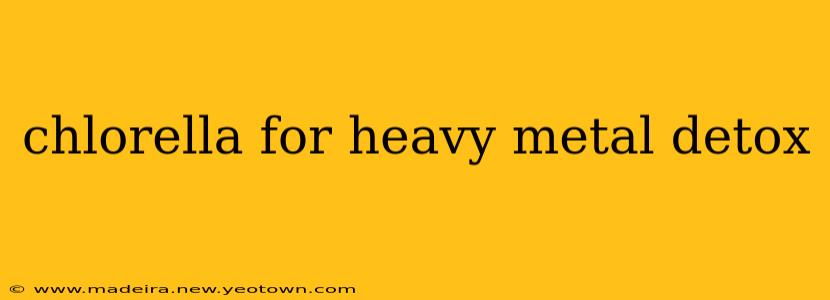The human body is a remarkable machine, but even the most robust systems can become burdened. One such burden is the accumulation of heavy metals, insidious invaders that can sneak into our systems through contaminated food, water, or air. For years, people have explored natural ways to support their bodies' detoxification processes, and among the rising stars in this arena is chlorella – a single-celled green algae packed with potential benefits. But does chlorella truly hold the key to unlocking heavy metal detoxification? Let's dive deep into this fascinating micro-organism and its purported effects.
Imagine a microscopic superhero, tirelessly working to cleanse the body of harmful substances. That's the image many associate with chlorella, a nutrient-rich algae that has captured the attention of health enthusiasts and researchers alike. Its microscopic size belies its impressive potential, particularly in the realm of heavy metal detoxification. But the story of chlorella and heavy metals isn't a simple one; it’s a complex interplay of science, anecdotal evidence, and ongoing research.
How Does Chlorella Work for Heavy Metal Detox?
Chlorella's potential for heavy metal detoxification is primarily attributed to its unique cell wall structure and its rich nutrient profile. The cell walls are thought to act like tiny sponges, binding to heavy metals like mercury, cadmium, and lead. Once bound, these metals are then supposedly eliminated from the body through the digestive system. This isn't a guaranteed process, however, and the efficiency can vary greatly depending on several factors.
Does Chlorella Really Bind to Heavy Metals?
This is a question that often arises. While studies have shown chlorella's ability to bind to heavy metals in vitro (in a lab setting), translating these findings to in vivo (in living organisms) efficacy is more complex. The human body is far more intricate than a test tube, and many factors influence absorption and excretion. Therefore, while chlorella can bind to heavy metals, the extent to which it achieves this in the human body remains a subject of ongoing research.
What are the Different Types of Chlorella?
There are several varieties of chlorella, the most common being Chlorella vulgaris and Chlorella pyrenoidosa. These differ slightly in their nutrient profiles and potential bioavailability, but the core mechanisms of action remain similar. The choice between them often comes down to personal preference and the specific product formulation.
Is there a difference in effectiveness between different types of chlorella?
While research is still ongoing and hasn't definitively established significant differences in heavy metal binding capacity between Chlorella vulgaris and Chlorella pyrenoidosa, minor variations in nutrient profiles might subtly impact their overall effectiveness. More research is needed to establish clear distinctions.
What are the Side Effects of Taking Chlorella?
Generally, chlorella is considered safe for consumption, but like any supplement, potential side effects exist. Some individuals may experience mild digestive upset, such as bloating or diarrhea, especially when initially starting to take chlorella. It's crucial to introduce chlorella gradually to allow your body to adjust. In rare cases, allergic reactions can occur.
Can Chlorella interact with other medications or supplements?
While chlorella is generally well-tolerated, it's always advisable to consult your doctor or a qualified healthcare professional before incorporating it, or any new supplement, into your regimen, particularly if you're taking other medications or supplements. Potential interactions can exist, and it's best to be informed and proactive.
How Much Chlorella Should I Take for Heavy Metal Detox?
There's no universally agreed-upon dosage for chlorella's use in heavy metal detoxification. Recommended dosages vary widely depending on the product, individual health conditions, and the specific goals. It's essential to follow the manufacturer's instructions and, more importantly, to consult a healthcare professional for personalized guidance. Self-treating heavy metal exposure can be risky, and professional medical advice is crucial.
Conclusion: Chlorella and Heavy Metal Detox – A Promising Avenue, But Proceed with Caution
Chlorella shows promise in supporting the body's natural detoxification processes, and its potential role in heavy metal detoxification is an active area of research. While in-vitro studies offer encouraging results, more robust clinical trials are needed to definitively establish its efficacy in humans. The use of chlorella should always be considered as part of a holistic approach to health, alongside a balanced diet, regular exercise, and medical guidance. Never consider chlorella a standalone solution for heavy metal toxicity; consult with a healthcare professional for proper diagnosis and treatment. Remember, this information is for educational purposes only and should not be considered medical advice.

